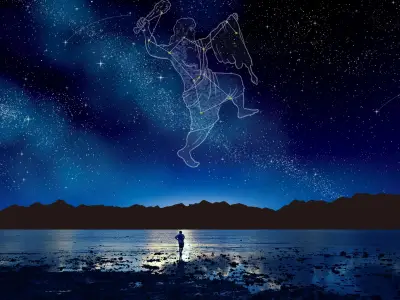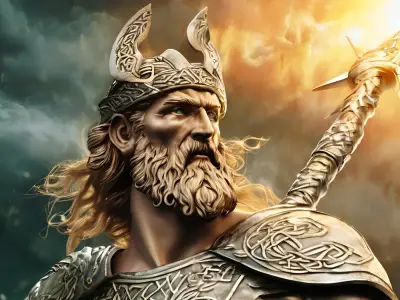If you’ve ever been curious about the powerful goddesses of Norse mythology, you may have come across the name Frigg. Often overshadowed by her husband, the mighty Odin, Frigg is an incredibly rich and fascinating figure in her own right.
Whether you’re exploring Viking legends for the first time or deepening your understanding of Norse deities, Frigg offers a window into themes of motherhood, prophecy, loyalty, and divine femininity.
Jump to:
Recommended for you!
Best SellersWho Was Frigg in Norse Mythology?
Frigg, sometimes spelled Frigga, is known as the queen of the Aesir gods and the wife of Odin, the chief god. She’s often referred to simply as Odin's wife, but she was much more than a consort. The Norse goddess Frigg was associated with love, marriage, fertility, family, and foresight. She held a role of great honour and was considered the highest-ranking female deity in the Norse pantheon.
The meaning of “Frigg” comes from an old Germanic word linked to love and beloved, which fits her role as a mother and nurturer perfectly. She’s a central figure representing the ideals and challenges of womanhood.
Frigg's Myths
Frigg appears in several notable myths, though much of her story has been lost to time. One of the most heartbreaking and memorable tales involves her son Baldur. When Baldur began having dreams of his death, Frigg, desperate to protect him, travelled across the Nine Realms to secure promises from everything not to harm him — from fire and water to metals and diseases.
However, she overlooked the mistletoe plant, thinking it too small to be dangerous. Loki, the trickster god, discovered this and crafted a dart from mistletoe. He then manipulated Baldur’s blind brother, Höðr, into throwing the dart, killing Baldur. Frigg’s grief was immense and remains one of the most emotional stories in Norse mythology.
The Role of Frigg in Norse Storytelling
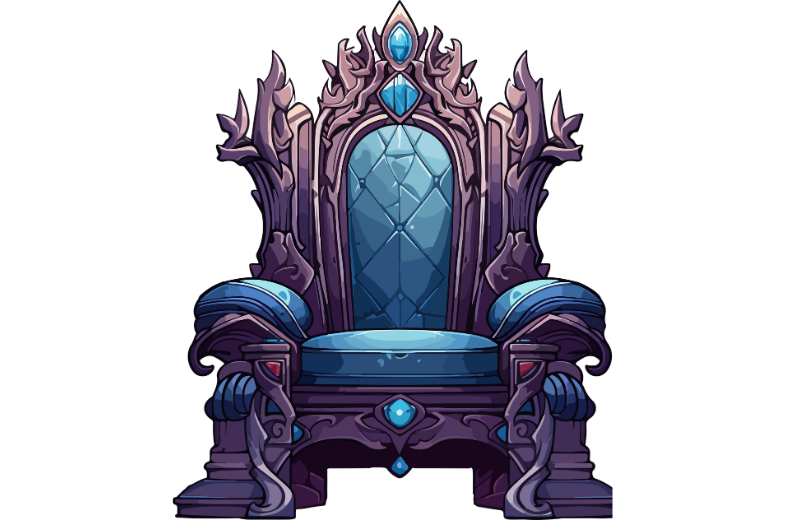
Frigg often appears in a background role, but her influence is far-reaching. She’s the silent power behind the throne, using her wisdom and foresight to guide decisions. In stories where Odin travels the realms, Frigg often remains in Asgard, watching events unfold from her throne, Hliðskjálf — the same throne that grants Odin the ability to see across all worlds.
In fact, it’s said that Frigg and Odin do not always see eye to eye, particularly when it comes to fate. In one tale, she disagrees with Odin’s judgement in a mortal conflict, showing she has both independence and divine authority.
What Powers Did Frigg Possess?
Though not described in precise detail, Frigg’s powers can be understood through her role and influence across Norse mythology.
- Foresight and Prophecy: Frigg was said to possess the power to see into the future. She knew what was to come but chose to remain silent about it. This ability gave her a quiet strength—she understood fate but did not interfere with it.
- Emotional and Spiritual Influence: As the goddess of love, marriage, and motherhood, Frigg held sway over the bonds that tied families and communities together. She inspired devotion, loyalty, and compassion. Her presence brought peace and emotional balance.
- Protection and Magical Authority: Frigg could influence oaths and blessings, and her magic extended into areas of childbirth, fertility, and safeguarding the home. She commanded a kind of divine magic that focused not on war, but on preservation and care.
- Control of Domestic and Mystical Space: Though not a warrior goddess, Frigg had mastery over the hidden and sacred. Her home, Fensalir, was shrouded in mystery, and she surrounded herself with attendants who managed secrets and sacred duties. Her domain was one of quiet, commanding power.
Symbols Associated with Frigg
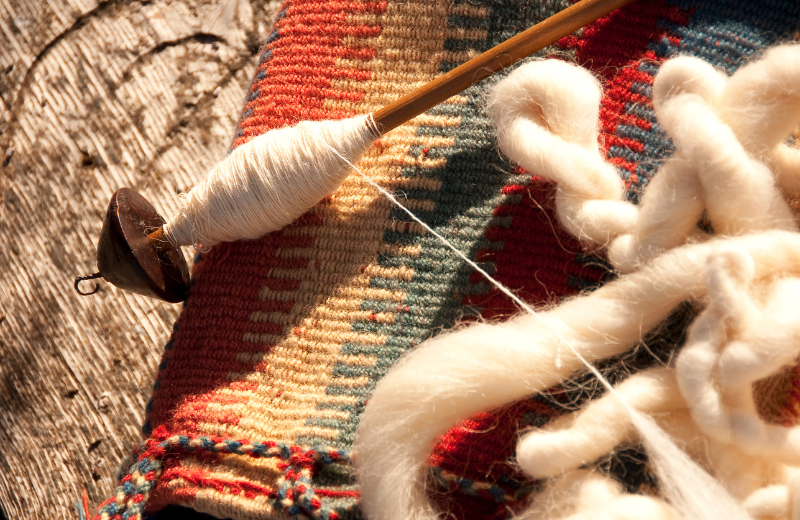
Frigg’s symbols were closely tied to her role as a mother and seer. One of the most notable is the distaff or spindle, tools used in spinning wool. These represent not only domestic life but also the weaving of fate—a nod to her ability to see the future.
Another strong symbol is mistletoe due to its tragic role in Baldur’s death. While often associated with peace and love today, for Frigg, it became a symbol of sorrow and the limits of even divine protection.
The hawk or falcon is also linked to Frigg, as she’s sometimes described as wearing a feathered cloak that allows her to fly. This connects her to freedom, watchfulness, and the higher perspective gained through her foresight.
Frigg’s Lineage and Connections
Norse mythology doesn’t look deeply into the origins of Frigg herself. Unlike other gods whose family ties are extensively recorded, Frigg’s own parentage is left largely undefined. However, her connections and relationships offer insight into her importance.
Frigg is best known as the wife of the Norse god Odin, and their partnership placed her in a powerful position among the Aesir gods. As Odin’s wife, she shared a level of wisdom that rivalled his own.
Together, they are said to have had several children, the most famous being Baldur, the beloved god whose death shattered the harmony of the gods. Some myths also imply that Heimdall, the watchman of the gods, might be another of their children, though sources vary.
While Frigg and Freya are sometimes compared or even confused, especially in later sources, they are not the same goddess. Freya is associated with war and desire, while Frigg governs the realms of fate and family. Their stories and symbolism make clear they are distinct figures with overlapping but separate roles.
Frigg’s relationships with other goddesses, such as her loyal handmaiden Fulla, show her command over a circle of trusted divine women. Each played a part in the preservation of sacred knowledge and mystical order.
Frigg in Modern Culture
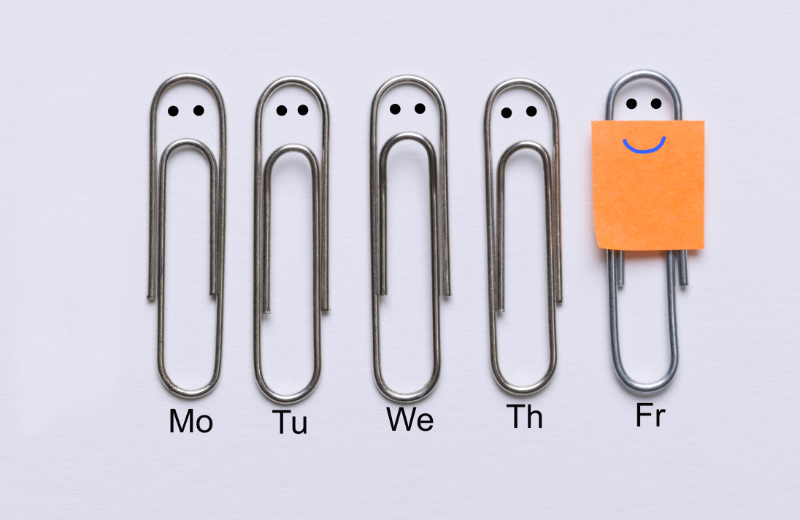
Frigg’s influence continues today, particularly through the naming of Friday, which comes from Frigg’s Day. It’s a quiet but lasting reminder of her role in shaping the week and her continued presence in everyday language.
She also appears in modern books, films, and television series that explore Norse mythology. In Neil Gaiman’s Norse Mythology, Frigg is portrayed with her characteristic grace and tragic foresight. She features in the Magnus Chase series by Rick Riordan, where elements of her role as a mother and goddess of foresight are woven into the narrative. In television, she has made appearances in series like Vikings: Valhalla and Ragnarok, often portrayed with a blend of wisdom, sorrow, and strength.
These modern depictions reflect her mythological roots—an elegant and dignified goddess, shaped by the weight of destiny and the loss of her son.
Frigg’s Worship and Legacy
In ancient times, Frigg would have been honoured by families, especially women, who looked to her for protection and wisdom. She was likely worshipped at household altars, with offerings given in the hope of healthy births, happy marriages, and loving homes.
Today, those interested in Norse spirituality still honour Frigg’s meaning as a symbol of love and destiny. Her legacy lives on in the stories, symbols, and even in the days of the week we use.
Recommended for you!
Best SellersFrequently Asked Questions About Frigg
Are Frigg and Freya the same?
While Frigg and Freya share some similarities—such as associations with love and magic—they are generally considered separate goddesses. Some theories suggest they may have originally come from the same source in older myths, but in Norse mythology, they are distinct.
Who is Frigg to Loki?
Loki is not directly related to Frigg, but he plays a devastating role in her life by orchestrating Baldur’s death.
What is Frigg’s weakness?
Her love for her children, particularly Baldur, could be seen as a vulnerability. Her inability to prevent his death reflects the idea that even goddesses cannot escape fate.
What is the day of Frigg?
Friday is named after her—Frigg’s Day.
Why did Odin call Freya Frigg? / Why is Freya called Frigg?
This confusion likely comes from later blending of myths. In many interpretations, Freya and Frigg were treated as one in post-Viking Age writings, but originally, they were separate.
What happens to Frigg after Ragnarok?
Most sources don’t detail her fate after Ragnarok, the end of the world in Norse myth. She fades from the stories, leaving her destiny as mysterious as her foresight.
How do you say Frigg?
Frigg is typically pronounced as “frig,” with a short ‘i’ sound, rhyming with “dig.”
Study Norse Mythology for £29
Norse mythology is full of fascinating gods, legends, and deeper meanings waiting to be explored. If you’re fascinated by Frigg and Norse mythology, why not take your knowledge further? At Centre of Excellence, you can enrol in the Norse Mythology Diploma Course for just £29! Learn about the gods, myths, and legends in greater depth and explore the rich history of the Vikings.










